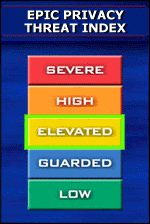 WASHINGTON - Introducing what it calls its own new Privacy Threat Index, the Electronic Privacy Information Center said April 15 that for threats to privacy from the expansion of government surveillance, the United States now stands at yellow alert - for "elevated."
WASHINGTON - Introducing what it calls its own new Privacy Threat Index, the Electronic Privacy Information Center said April 15 that for threats to privacy from the expansion of government surveillance, the United States now stands at yellow alert - for "elevated."
But EPIC plans to continue watching not just American but international privacy thrats, said executive director Marc Rotenberg at the RSA 2003 conference of network and electronic security professionals. "We will use the Privacy Threat Index to assess developments in the United States and to compare activities in countries around the world," he said.
EPIC said that comes from factors like expanded Foreign Intelligence Surveillance Act use, "which permits the government to conduct surveillance without the general safeguards required by the Fourth Amendment; the FBI's decision to ease off on the accuracy requirement for the National Crime Information Center; more funding for surveillance systems; the so-called Patriot Act II, "that would further expand government surveillance authority"; and, FBI efforts to bring Internet telephony under the Communications Assistance for Law Enforcement Act that mandates wiretap-friendly communications service development, among other factors.
The Privacy Threat Index measures green as low, blue as guarded, yellow as elevated, orange as high, and red as severe. Still, EPIC said, even on yellow alert not all could be called the proverbial doom and gloom. The privacy watchdogs said the U.S. has rejected mandatory national ID cards "so far," and the controversial proposed Total Information Awareness research program was suspended by Congress pending an investigation.
EPIC said they would use the Privacy Threat Index when presenting the results of their 2002 Privacy and Human Rights Survey in the fall at the National Press Club.









